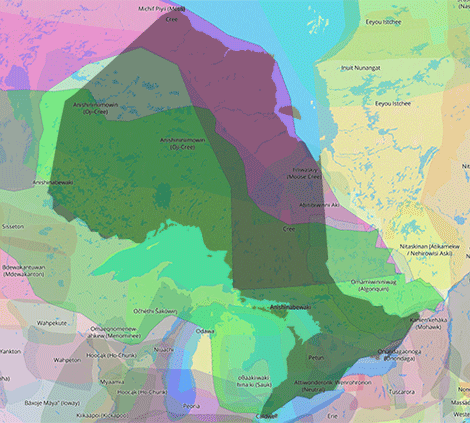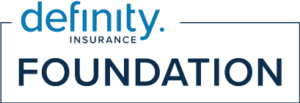Commitment to truth, reconciliation and reciprocity
In order to decolonize, organizations can’t decolonize fragments of the work, you can’t choose what you want to lean into around Indigenous sovereignty or reciprocity. Non-Indigenous organizations need to move beyond surface level engagement, there needs to be meaningful engagement and relinquishment of power and control.”
Tanya Ironstone Locke, Executive Director, Child Welfare League of Canada
ONN’s work, and the work of our network, take place on traditional Indigenous territories all around Ontario. The ONN office is located at Foundation House. Elder Pauline Shirt referred to Foundation House as “Sitoskatsewin”, which means “balancing one another”. It is located on the traditional territory of the Wendat, the Haudenosaunee, and the Mississaugas of the Credit. This territory is part of the Dish with One Spoon Treaty, an agreement between the Anishinaabeg, Haudenosaunee and allied nations to peaceably share and care for the resources around the Great Lakes. This territory is also covered by the Upper Canada Treaties.
We offer our gratitude and solidarity to the Indigenous Peoples who have, and continue to care for, protect and defend this land. Although it is important to acknowledge the land, it is only a first step. Allyship is a continuous process; it is not a designation that one can earn and hold forevermore.
As settlers within the nonprofit sector it is important that we recognize that colonization is an economic project based on land theft, genocide and violence, as stated in the Yellowhead Institute Red Paper, “Cash Back”. We are all treaty signers, and are thus responsible and accountable for the violence that Indigenous Peoples face. The impacts of colonization and white supremacy can be felt, heard and seen within every industry such as education, health, social service, justice systems, and more. As settler-led nonprofit organizations, it’s particularly important for us to name the active role we play in perpetuating colonization and white supremacy through historical, and current, policies and practices.

Resource: Whose Land
Whose Land is the product of a shared vision between BOLD Realities, TakingITGlobal, and Canadian Roots Exchange, who identified the need to create a platform to increase knowledge and awareness of Indigenous territories, communities and Treaties. And to help create dialogue around Indigenous territory recognition and acknowledgement.
We also seek to partner with Indigenous organizations in respectful ways and learn from Indigenous communities about collective ownership, collective enterprise, and sustainable economic and environmental systems. We extend our respect to all First Nations, Inuit and Métis Peoples for their valuable past and present contributions. We are mindful of broken covenants and the need to reconcile with all our relations. Together, may we care for this land and each other, drawing on the strength of our mutual history of nation building through peace and friendship, keeping in mind the generations to come.
ONN is committed to addressing racism and white supremacy and working towards truth, reconciliation and reciprocity, and racial justice in the nonprofit sector, and the communities our sector works alongside. Please note that this acknowledgement will evolve over time.
How to go beyond a land acknowledgement
Do a self-assessment. Before creating an action plan to support Indigenous people and nations, it’s important to analyze what you’re already doing. Are any of your current behaviours causing harm? If so, it’s possible to change your habits to prevent future damage. Hold yourself accountable for changing your habits in your action plan.
Do a resource assessment. What resources can you personally provide to support Indigenous people and nations? Don’t be afraid to get creative here.
Do your research. We recommend investigating the following questions to inform your plan. These questions will help you better understand what’s happening in your area and how you can help. (This is not an exhaustive list: create your own research questions, too!)
- What is the Indigenous history of the land I occupy? Can I find any Indigenous place names for locations or landmarks in my area?
- What first nations are located closest to me? How do I pronounce the nation’s name? What projects is the nation working on? Who are their elected leaders? What are their goals for the future?
- What is my city doing to support Indigenous communities? Is my place of worship, club, gym, etc. doing anything to take action?
Outline concrete plan steps with specific, measurable actions. Look for points of alignment between your resource assessment and your research. For example, what areas of action is your organization taking around the 94 Calls to Action from the Truth and Reconciliation Commission.
And during your research, you might have discovered that community members are currently convening to protest the installation of a new pipeline on Indigenous land. Use this alignment to create an action step.
Go public. Don’t keep your plan to yourself. Share your action steps with your friends, family, and neighbours. Put them on Instagram. Tell your community that you are committed to supporting Indigenous people, and challenge people in your life to create their own plan.
Keep your action plan somewhere handy. Your action plan doesn’t belong in a drawer. Print it out and put it on your fridge. Store it in the notes section of your phone. Put it somewhere that will help you see it regularly.
Reflect on your progress. Your action plan is an ongoing commitment. Our lives constantly change, and so will your relevant actions. Reflect on your progress from time to time. How many of your action steps have you actually completed? What have been the biggest barriers to carrying out your plan? Are you making any life changes that will make it difficult to continue executing your plan as written? If so, restart your self-assessment and resource assessment, and outline new steps that work for you.
Stay humble. This work is ongoing; your learning does not stop at your action plan. Know that all of us have room to grow and more to learn. If someone calls you in (or out) on your plan, accept their words gracefully and use the moment as a learning opportunity.
Source: Beyond Land Acknowledgment: A Guide – Native Governance Center
Resources
Seeding Reconcilation on Uneven Ground
The 4Rs Youth Movement has developed a detailed framework to engage Indigenous and non-Indigenous young people in cross-cultural dialogue. Their work is is grounded in the idea that in order to change relationships, people need to share an experience together in order to engage in conversation that in both process and content encourages respect, reciprocity, reconciliation, and relevance. The framework describes essential elements in this shared experience, within which such dialogue can take place.
Althosa Healing Services
FAQS to build your cultural awareness and engage in respectful relationships with Indigenous people. Atlohsa Family Healing Services is a non-profit, charitable organization that has been serving individuals and families across Southwestern Ontario and beyond since 1986.
The Feasthouse – A platform for Indigenous Abundance
We would like to highlight a resource developed by The Circle on Philanthropy called The Feasthouse. “It is a place to be in and among Indigenous power, strength, responsibility and generosity. Come in, you are invited to feast with us.”



